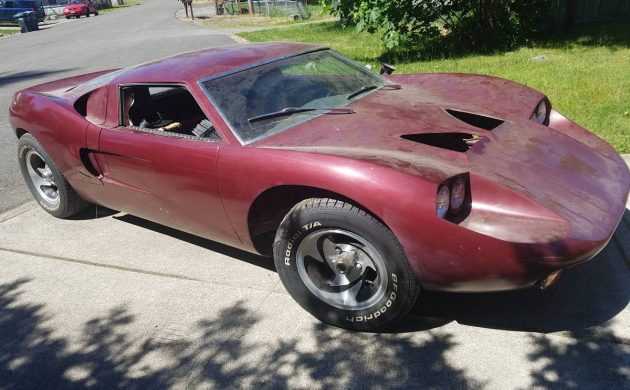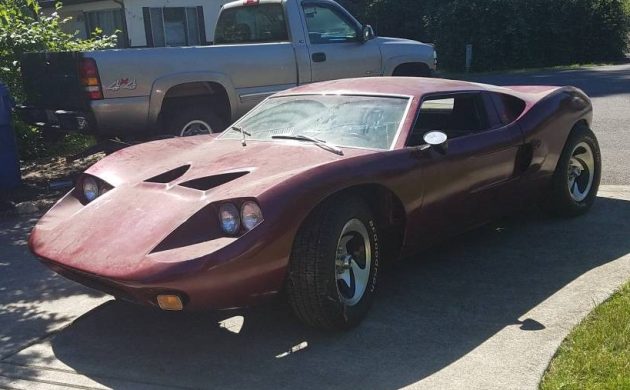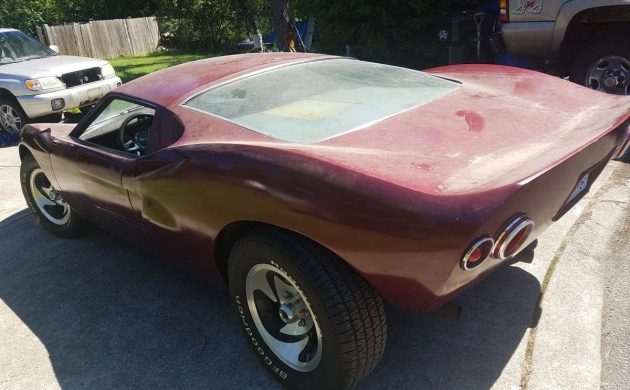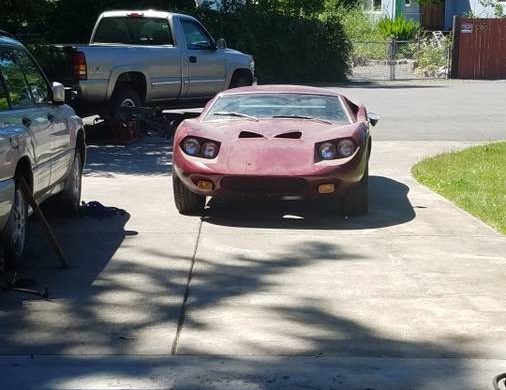It’s said that imitation is the most sincere form of flattery. Yet this fiberglass beauty is certainly its own animal, and the car that inspired it surely needs no further praise. This is a 1970 Fiberfab Valkyrie, located in Tacoma, Washington, and advertised here on Craigslist. As to what it would cost to put this classic in your garage, asking price is $12,000– unless you have a tractor with backhoe that you’re willing to part with. Many thanks to SEAN for this tip!
Obviously inspired by, but just as obviously distinct from, the Ford GT40, the Valkyrie was launched in 1966 and proved to be a very successful model for the two-year-old Fiberfab. In fact, the Valkyrie was offered not only as a kit for home builders, but as a fully assembled car, the 500 GT. For $12,500, the owner got disc brakes, a five-speed ZF transaxle, a 427 V8 making 500 hp, and a parachute. The home-built kit was much more affordable, coming in at just under $1,500, but required the owner to source his own drive train. The manual suggested a small block Chevy– either a 283 or, like this car, a 327– but this would still be more than enough to push this lightweight three or four steps past grin-inducing speeds.
Sadly, neither the founder of Fiberfab, Bud Goodwin, nor his young wife (and company president) Jamaica would live to see this example roll. Only a year after the debut of the Valkyrie, Bud would be arrested for the shooting death of Jamaica. Maintaining that her death was an accident, he pleaded no contest to a charge of voluntary manslaughter and was sentenced to 12 months in prison where he died, age 47. While the death of its president and arrest of its founder threw the company into turmoil, it eventually found its footing under the leadership of Richard Figueroa, formerly special projects manager, and went on to produce some of the more wild kit cars of the seventies.
The owner states that while the car isn’t currently complete, it wouldn’t take too long to put it back into driving condition. Nothing explicit is said about the state of the engine, but the 327 does come paired with a Corvair transaxle and the ad invites interested parties to contact the owner. Original instructions, paperwork, and the acrylic headlight covers also come with the car. The Valkyrie is more rare than the later Avenger, and unlike the Avenger, the Valkyrie is mid-engined, making weight distribution much more even and giving the car the potential for some excellent handling. With solid performance and GT40 looks, this is sure to make someone a very happy driver.







Fiberfab kits were among the best in the industry in both looks and build but the company made a couple of fatal mistakes. I think they could be around today if only they had hung the doors and installed the door windows. Those two item are two of the most complex items in the assembly of any car. Most of the kit builders those tasks were above what they could accomplish by themselves or with friends helping. I was also not thrilled with the dash boards on either the Jamaican or the Avenger / Valkyrie kits. The sourcing of other parts was really good and reduced the cost and work involved dramatically.
This company should have make it much longer than it did because they had a really good product. From the photos of this car I am not certain the side window are there and in addition are they are installed are they crank or powered. You have to see either or both in real life to understand how much better these cars were styled over the other kit cars of the time and even today. These shapes were right and in many ways equal to or better than even then what the big manufacturers were giving out for sale.
This looks like a good one but check the door lock operation, windows and wipers. That is where most kits have the most problems. Wiring is also a trouble spot but in todays world there are makers that can supply wiring looms for almost anything.
Good luck, I have been there and done that with a Jamaican set up for a Austin Healey and those were the areas I had all the trouble with. The shop I got it from had a couple of these for sale but they and the shop are long gone in my youth. I learned a great deal and was glad I made the effort for trying to make one of these into a real car is an education that is hard to beat.
Trades are always tough, you need to sell what you have and then buy what you are looking for. Engine photos would help.
Bruce,
I too am a fan of the Fiberfab company. The model that I built and still drive is the 1st-generation, one piece body. It utilizes the early plans that I slightly tweaked. I still have the original build plans from Fiberfab. The body itself is mated to an already well German engineered 1971 VW IRS pan with added four wheel disc brakes. The power plant is a stroked 2300cc aircooled flat-four (approximately 150+ hp) with plenty of room for added hp if so desired. The transmission is a later ’60’s VW unit (4 speed). The original plans for these garage builds were cleverly sorted so the average person could go to the nearest wrecking yard to source all of the necessary parts. The windshield came from a mid ’60’s Corvair. The rear glass was out of a ’65 Mustang fastback. The side windows were made of molded lexan (curved). These fitted nicely into ’67 VW Beetle regulator assemblies. For a functional and finished look, one would use mid ’60’s Ford LTD rubber weather stripping and the necessary felt and scraper trim. The door hinges were mid ’60’s Mustang. The interior door handles were also mid ’60’s Mustang. The outer door handles were mid ’60’s recessed AMC (clever choice back then, it gave it a track look). I run early black faced VDO gauges (pure analog driving). The steering wheel I chose is a hand made Italian Nardi 13″. The seats are molded fiberglass covered in black vinyl upholstery. The interior remains spartan. I recently replaced the rear ’65 fastback glass with the C. Shelby created vented K-series plexiglass. This allows for nice ventilation, countering the otherwise greenhouse affect created by the radical slant of the windows. For Shelby’s purpose of course, this was to relieve the tremendous pressure built up in the cockpit, created at those high speeds.
“Continue to innovate not duplicate” 🛠🔩🔧
Gt-12 Avenger…
I forgot to add the name of the model build.
Get ride of those hideous rice racer wheels and put on some torkthrust wheels and now we’re taking
Extreme caution advised.
If you go to the CL ad, take a look at the corrosion on the carburetor, and you’ll be wincing a bit. Oof.
I believe that the transmission is 1965, based on appearance, not nearly as strong as the 1966 and later Saginaw versions. I don’t know if the adapter seen/used here would fit the later box or not.
This is Definitely a big project, not a runner with just a little work. The seller’s statement “…will not take longer than a weekend to put on the road.” is very misleading. If that were true, he’d be better off to do that himself!
Could be a lot of fun. I wonder what it has for a front suspension and brakes. Many questions, and I just don’t see him getting much of a tractor/backhoe in trade. Lower end and older ones still fetch far more than what this car is actually worth.
Edit: Yep, the wheels don’t do this any favors at all.